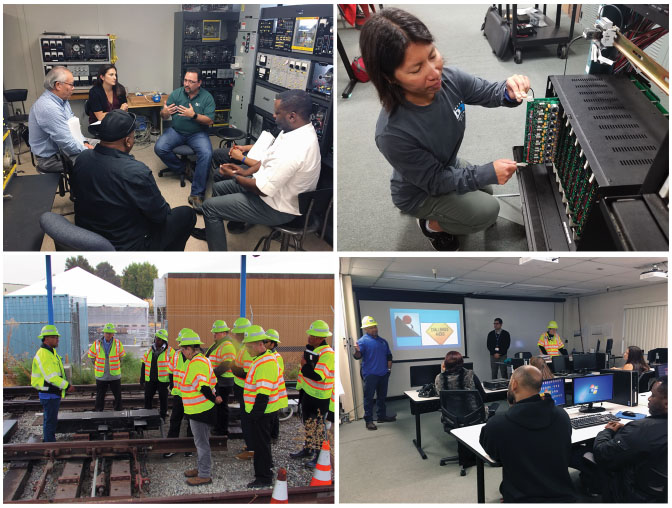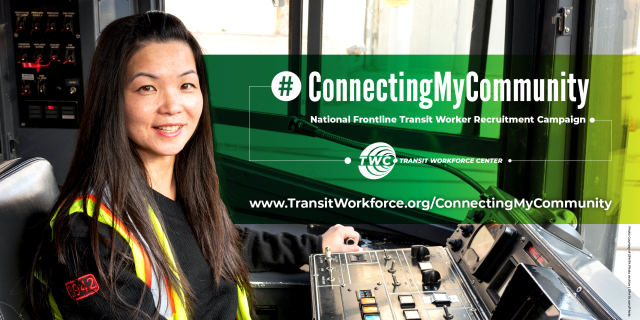Workforce Development Initiative

Transit Workforce Center
The Transit Workforce Center (TWC) is the first FTA-funded technical assistance center to directly support public transit workforce development. Its mission is to help transit agencies recruit, hire, train, and retain the workforce needed now and in the future. The TWC will also help address the national transit worker shortage by providing technical assistance activities geared toward developing frontline transit workers’ skills and recruiting workers to transit careers through various programs, such as apprenticeships and partnerships.
The center is supported by a cooperative agreement with the International Transportation Learning Center.
Over the past decade, FTA has invested more than $20 million for transit workforce development, funding over 45 grants. The TWC builds upon the findings of these critical investments by assisting transit agencies in developing comprehensive, research-based workforce development programs. TWC staff will also use their experience and knowledge of bus electrification operations and maintenance to reskill and upskill current and future transit workers.
For technical assistance, complete the Technical Assistance Request form or email the TWC.

The transit workforce is more important than ever. The #ConnectingMyCommunity toolkit from the national Transit Workforce Center provides sample strategies, tips and ready-to-use materials to design effective recruitment campaigns.
Overview
The FTA Workforce Development Initiative provides resources and support for public transit agencies to recruit, retain and train transit workers to ensure the transit industry has the workforce needed for today and in the future. Elements of the initiative include:
- Cooperative agreements with transit agencies to develop innovative workforce projects
- Reports and information on the results of those projects
- Meetings and conferences to gather information about public transit agency workforce issues/concerns
- A new transit workforce technical assistance program
Over the last decade, FTA provided over $20 million to fund innovative workforce grants, and to date, most of those grants are complete. See the evaluation reports. This initiative also ensures that agencies can upskill, reskill, and hire workers for current and new jobs emerging through advanced technologies.
FTA’s Workforce Development Initiative seeks to:
- Provide a road map and strategic support to help transit agencies recruit, retain, and train their workforces
- Help agencies use the half of one percent available from urbanized area formula grants and other funding investments to develop workforce initiatives that address the unique needs of each agency
- Partner with the Department of Labor to help agencies leverage funding and initiatives across both federal agencies
- Help support the development of internships, apprenticeships, and/or work-based skills training
- Develop curricula for transit operators and engineers/technicians especially in safely working with new-technology buses while ensuring there is no duplication of training activities led by the National Transit Institute
- Support academic and technical trade education partnerships, especially with community colleges
- Assess and develop partnerships with social services programs to ensure workforce development programs also have resources to support worker transitions from other fields
Eligible Activities
FTA’s Workforce Development Initiative is authorized under FTA’s Technical Assistance and Workforce Development Program (49 U.S.C. § 5314). The types of projects eligible for funding under this program include 1) technical assistance, 2) human resources/training, and 3) innovative public transportation frontline workforce development.
- Technical assistance activities
- Human resources and training projects including:
- Employment training programs
- Outreach to specific populations
- Research on public transportation personnel and training needs
- Training and assistance for veteran and minority business opportunities
- Consensus-based national training standards and certifications in partnership with industry stakeholders
- Innovative public transportation frontline workforce development projects including:
- Developing apprenticeships, on-the-job training, and instructional training for public transportation maintenance and operations occupations
- Building local, regional, and statewide public transportation training partnerships with local public transportation operators, labor union organizations, workforce development boards, and workforce agencies to identify and address workforce skill gaps
- Improving safety, security, and emergency preparedness in local public transportation systems through improved safety culture and workforce communication with first responders and riders
- Addressing current or projected workforce shortages by developing partnerships with high schools, community colleges, and other community organizations
Eligible Recipients
Eligible applicants depend upon what type of project is being funded. Typically, eligible recipients include urban and rural transit agencies; state departments of transportation providing public transportation services; metropolitan planning organizations; Indian tribes; nonprofit institutions; and institutions of higher education.
Statutory References
Technical Assistance and Workforce Development Program (49 U.S.C. § 5314)
Allocation of Funding
Workforce Development Program projects are funded annually under the Technical Assistance and Workforce Development Program (49 U.S.C. § 5314).
Match
Typically, federal grants under this program provide an 80-percent government share, leaving a 20-percent match requirement for recipients. Recipients may derive that match through in-kind activities not funded by the federal government and match from other federal agencies as noted in the Coordinated Council on Access and Mobility resources on match.
However, projects funded under Technical Assistance and Workforce Development Program (49 U.S.C. § 5314 (a)), through a cooperative agreement (not a grant), may be funded at 100 percent and do not require a local match.
Funding Mechanism
Competitive Cooperative Agreement
Previously Awarded Workforce Projects
- 2015 Innovative Workforce Development Grants
- 2012 Innovative Workforce Development Grants
- 2011 Innovative Workforce Development Grants
Resources
- Bus Operator Workforce Management: Practitioner’s Guide (TCRP Research Report 240)
- Innovative Transit Workforce Development Projects of 2015: Summative Evaluation (Report 0153)
- Innovative Transit Workforce Development Program: Key Lessons Learned (Report 0139)
- Innovative Transit Workforce Development Projects of 2012: Summative Evaluation (Report 0128)
